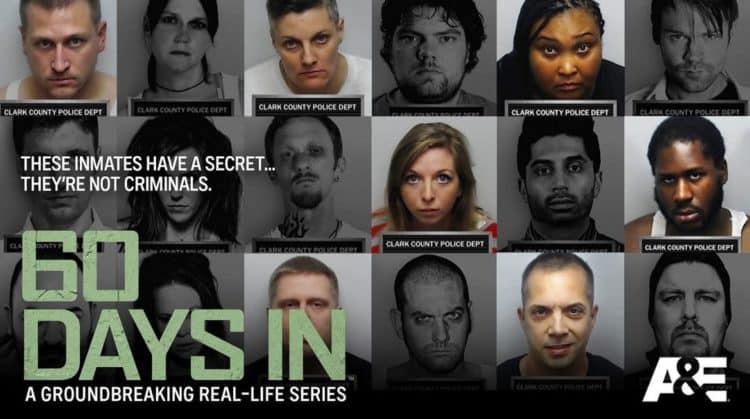
The show 60 Days In is a fascinating look at prison culture. Volunteers agree to go undercover inside the system as film crews follow their journey under the premise that they are doing a documentary about new inmates experiences inside. It takes a special kind of person to agree to be incarcerated just so someone else can study what happens to people behind bars and how to keep them from getting away with even more crime. In order to get evidence of prisoners illegal activities, prison officials allow these unusual people to enter the penal system. Guards and cameras do everything they can to make sure the inmates aren’t breaking rules, getting their hands on drugs and brewing up hooch under their beds, but there’s just no way to catch everything that happens, even in the most heavily scrutinized environment. The show always aims to do some good and help the officers and officials cut down on illegal activities within the system, but things don’t always work out the way they anticipated.
Risk Vs. Reward
Fears over the show spoiling the useful effect of having these spies in the midst of the jailhouse caused producers to film season two before the original aired. That’s a big risk for any station because viewers might not watch the show in the first place. We’ve all seen shows we liked get canceled before we thought they had a fair run, and the same could have happened to 60 Days In, but they got lucky. Americans have been glued to their screens in anticipation since the show began in 2016. Since then the five seasons have seen dozens of people take up the mantle of a fake prisoner. They all get a cover story that shows they broke the law and got caught, but unlike other prisoners there, they can always opt-out and have themselves removed back to their normal life. Some like Maryum Ali, daughter of famous boxer Muhammad Ali, had false names as well.
And Then The World
As it turns out, the US prison system is a subject a whole lot of people are intrigued by, and viewers from around the globe have turned out in droves to see what happens in the country with a mere four-point-four percent of the world population and around twenty-two percent of its prisoners. American Justice and incarceration are a subject of much curiosity for people everywhere. So, as it turns out A&E’s risk paid off in the end. Not only is the show popular, but it’s so widely and unexpectedly enjoyed by viewers that 60 Days In airs in over a hundred countries. The whole world wants to know what people in US lockup are going through for various reasons. Some like the real-life drama, others have a special interest in why we have so many people imprisoned. Whatever the reason, people have stayed tuned in for almost half a decade and 60DI shows no signs of losing its popularity now.
The First Spinoff
60 Days In: Narcoland is a little different from its predecessor. Some of the volunteers certainly spend time in lockup. The in-prison angle hasn’t been totally abandoned. However, Narcoland follows people outside of the prison system as well to give viewers a look at the drug trafficking that has become so problematic in the middle of America. The Midwest, often called the Heartland has become riddled with drug trafficking in recent years. In an effort to help bring awareness and hopefully bust some bad-guys in the process the Narcoland spinoff aims to identify people connected with trafficking and cartel activity in Clark County and Bullitt County, Kentucky.
Surprising Spinoff
60 Days In: Inmate to Officer followed the ongoing tale of Sheri Ray, a correctional officer who was on the first season of the original show. Her experiences inside changed the way she looked at being a guard. Obviously it made her more savvy to some of the tricks prisoners use to get away with things they shouldn’t on the inside, but it also gave her some empathy for what they go through. As a result, Sheri has become better at her job and helped to institute new policies that aid inmates in understanding what’s happening when they go to jail for the first time among other things.
Aftermath
Lately, a lot of reality shows shoot a behind the scenes show for fans. 60DI is no exception. If you’re curious about what it was like for the faux prisoners and what’s changed about their lives, you can see more on 60 Days In: Aftermath. The second spinoff does reunions and gives audiences some additional insights into what else goes on when someone volunteers for a social experiment like going to prison.
Not a Spinoff Yet
Alan Oliver hasn’t got his own spinoff from the show, but the former police officer also had a change of heart after his season in prison. It changed his mind so completely that he found himself unable to continue on the force. He wasn’t aware of how the criminals he arrested were being treated after they left his care and it made him re-think his career path. Now Alan has become a car salesman, and hopefully, he’s much happier for the change.
A Strange Revelation
It wasn’t just Sheri and Alan who were changed by their time inside. Apparently all the undercover prisoners changed in their time as false prisoners. While producers and fans all waited with bated breath to see how the otherwise normal cast would react to being treated like common criminals, what surprised them most was that people acted exactly like the criminals around them. They adapted to their environment by becoming a part of it. The spies treated prison life just like those who were there for legitimate reasons and formed alliances, tried to manipulate the system and otherwise behaved exactly the way they would have if they’d actually been arrested.
Final Thoughts
What’s next for 60 Days In in light of this revelation? We honestly don’t know, but it seems people are as taken with the show as ever, so it’s not likely that A&E will give up this formula anytime soon. There’s a lot more to learn about these four 60 Days shows. Though no one was quite prepared for what would happen when they began filming, a number of crimes have been stopped. Moreover, corrections officers were fired for mishandling their duties, and other largescale changes have happened as a result of the show. We’d never call it a lighthearted watch, but the show is admirable and has a way of really immersing you in the dramas and details of what’s going on in prisons and on the streets as a result.
 Follow Us
Follow Us





